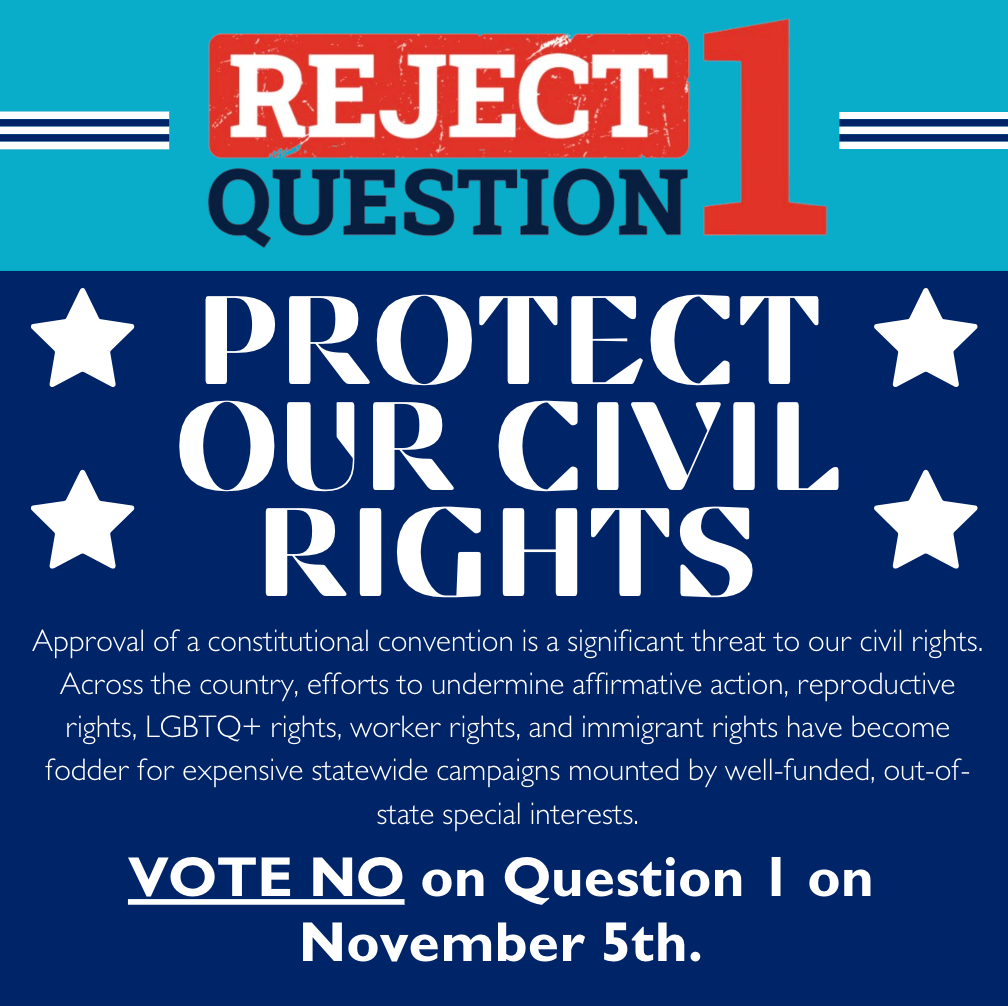Why give far-right activists another platform to attack civil rights?
By Mary-Murphy Walsh, Rhode Island Current
“You can pry this wedding ring from my cold, dead, gay hands.” That was Michigan Attorney General Dana Nessel’s defiant message to Donald Trump at the Democratic National Convention, confronting his threats to LGBTQ+ rights.
Democrats in Rhode Island might believe our state constitution shields us from such assaults on our freedoms. However, Question 1 on the Nov. 5 ballot poses a direct threat to our rights here at home. Alarmingly, most voters are unaware that the critical issue the first ballot question involves is even on the table.
Question 1 asks whether Rhode Island should hold a constitutional convention — a gathering of 75 elected delegates empowered to propose amendments to our state constitution. While this might initially seem like an opportunity for positive change, it is fraught with peril. Such a convention opens the door for sweeping alterations to our fundamental rights. Delegates could be anyone, potentially influenced by unlimited spending from out-of-state special interest groups with extreme agendas. Once elected, these delegates aren’t held accountable and can pursue their own objectives without the usual checks and balances that govern our legislative process.
History warns us of the dangers. In the 1986 constitutional convention, amendments were proposed to restrict a woman’s right to choose and to disenfranchise voters. But pro-life advocates weren’t satisfied with stopping there; their goal was — and continues to be — to erode the rights of women, workers, immigrants, LGBTQ+ individuals, and people of color. The convention led to costly chaos and setbacks on several constitutional protections. We cannot afford to repeat the mistakes of the past.
Young Democrats under 35 weren’t alive or were too young to remember the turmoil of 1986. Learning about its consequences has been alarming. Between 1986 and 2014, there were 13 attempts to ban same-sex marriage in our state, according to the ACLU of Rhode Island. It wasn’t until 2013 that marriage equality was legalized in Rhode Island. In 2014, the question of a constitutional convention appeared on the ballot again. Many, like myself, were unaware of its significance. Now, as a gay woman with my right to marry under threat from leaders who oppose equality, I’m reminded of how critical this decision is.
A constitutional convention today could dismantle protections not just for LGBTQ+ individuals but also for women, workers, immigrants, and people of color. Our state’s constitution currently safeguards reproductive rights and workers’ rights to organize, demand fair wages, and ensure safe working conditions. These rights are the result of decades of struggle and activism. Conservative groups, some aligned with Trump’s ideology, aim to reverse this progress, and a convention would give them the perfect opportunity.
Proponents argue that a convention could bring positive changes, like implementing ethics reforms or increasing the minimum wage. This is misleading. The reality is that powerful special interests are more likely to dominate the agenda. There’s a real threat that Rhode Island could become a “Right to Work” state, weakening unions and leaving workers vulnerable. It’s telling that the Rhode Island Center for Freedom and Prosperity, an organization opposed to workers’ rights to unionize, supports Question 1. Their agenda is to dismantle protections that empower working families, disproportionately affecting
Moreover, there’s no cap on how much out-of-state special interests can spend to influence the convention. With delegates not subject to recall or oversight, these deep-pocketed groups could heavily sway the process without fear of repercussions. This lack of accountability comes with the risk that harmful changes could result after the convention is underway.
With Rhode Island being the only state this year with such a question on the ballot, we could become a prime target for groups eager to impose radical agendas. A convention would unleash unregulated spending and undemocratic processes, turning our state into a battleground for divisive policies aimed at reversing civil rights advancements. We could become a testing ground for initiatives that undermine public education, workers’ rights, and social services that many Rhode Islanders rely on.
We must not be complacent. The rights of women to make decisions about their own bodies, the ability of immigrants to live without fear, the fight against systemic racism, and protections for workers — all are imperiled by the prospect of a constitutional convention. These conservative groups aim to unravel progress for all marginalized communities, threatening the very fabric of our inclusive society.
As Young Democrats of Rhode Island, we are committed to protecting our democratic values and the rights of all Rhode Islanders. The allure of a constitutional convention is a dangerous mirage. The supposed benefits are outweighed by significant risks that could have lasting negative impacts on our state.
GET THE MORNING HEADLINES.
Rhode Island Current is part of States Newsroom, a nonprofit news network supported by grants and a coalition of donors as a 501c(3) public charity. Rhode Island Current maintains editorial independence. Contact Editor Janine L. Weisman for questions: info@rhodeislandcurrent.com. Follow Rhode Island Current on Facebook and X.
